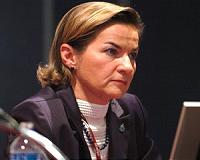| . |  |
. |
Washington (AFP) May 18, 2010 The US climate negotiator said Tuesday it was politically unrealistic for the next treaty to impose global targets on emission cuts, amid deep divisions between rich and developing nations. Special envoy Todd Stern said a better model was the "bottom-up architecture" proposed by Australia during last year's Copenhagen summit, in which each nation submits details of its own actions to the United Nations. "No across-the-board, top-down target would be acceptable at this stage to most developing countries and, indeed, it would not work well for us either," Stern said at The Brookings Institution, a Washington think-tank. "The notion that you're going to negotiate some across-the-board target with China, India, Brazil and South Africa and many other countries... is not that likely." Over 190 nations are negotiating a successor treaty to the Kyoto Protocol to fight climate change, which UN scientists warn could bring growing disasters and threaten entire species if left unchecked. The Kyoto Protocol had set a target of industrialized nations cutting emissions blamed for global warming by an average of five percent by the end of 2012 from 1990 levels, with a corresponding figure calculated for each country. The United States was the only major nation to reject the treaty, arguing it was unfair because it made no demands of fast-growing emerging economies such as China -- now the top carbon emitter. President Barack Obama reversed course when taking office by seeking action on climate change, but Stern said he was mindful of the political lessons from the Kyoto pact, which he helped negotiate under former president Bill Clinton. "We sort of came into this with a sense that the way we did Kyoto didn't work so well," Stern said. "We negotiated the target in Kyoto not only before there was any law, but before there was any foundation of domestic support" for legislation, he added. The US Senate just last week took up a bill that would set up the first nationwide plan to curb carbon emissions, although individual states have taken similar initiatives. "It is enormously important for our international leverage and credibility that we pass strong legislation," Stern said. "If the United States means to assert leadership, it needs to act like a leader." Yet the envoy cautioned that the roadblocks to reaching a final agreement "wouldn't disappear" even if the United States approved climate change legislation. China and other major developing nations have argued that wealthy countries bear historic responsibility for climate change and have balked at any legally binding targets, particularly without firmer US action. India's environment minister, Jairam Ramesh, said on a visit to Beijing earlier this month that prospects for a breakthrough in time for the next major climate meeting in December were "very, very remote." Ramesh said talks in the Mexican resort of Cancun may produce a political statement expanding on the Copenhagen accord but would not yield an agreement. The Copenhagen accord called for nations to work together to stave off warming to 2.0 degrees Celsius (3.6 Fahrenheit) from pre-industrial levels. But voluntary pledges registered under the deal put the Earth on track for increases of 3.5 to 4.0 degrees Celsius (6.3 to 7.2 Fahrenheit).
Share This Article With Planet Earth
Related Links Climate Science News - Modeling, Mitigation Adaptation
 U.N. climate chief wants to build bridges
U.N. climate chief wants to build bridgesBonn, Germany (UPI) May 18, 2010 Christiana Figueres of Costa Rica is the new U.N. climate protection chief. Appointed Monday by U.N. Secretary-General Ban Ki-moon, Figueres is to succeed Yvo de Boer as the head of the U.N. Framework Convention on Climate Change when the Dutchman steps down July 1. Figueres, 53, knows the climate circus well: She has been a negotiator for her country since 1995, has helped draft ... read more |
|
| The content herein, unless otherwise known to be public domain, are Copyright 1995-2010 - SpaceDaily. AFP and UPI Wire Stories are copyright Agence France-Presse and United Press International. ESA Portal Reports are copyright European Space Agency. All NASA sourced material is public domain. Additional copyrights may apply in whole or part to other bona fide parties. Advertising does not imply endorsement,agreement or approval of any opinions, statements or information provided by SpaceDaily on any Web page published or hosted by SpaceDaily. Privacy Statement |